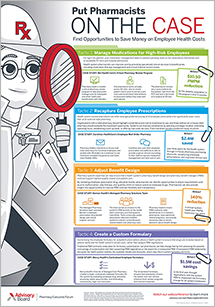Auto logout in seconds.
Continue LogoutEditor's note: This popular story from the Daily Briefing's archives was republished on Nov. 25, 2019.
Physicians and nurses see firsthand the devastating financial effects unforeseen health care events can have on uninsured or underinsured patients, but they also witness the increased cost sharing and administrative burdens associated with insurance—leading some to drop their own coverage, Emma Ockerman reports for Bloomberg.
Health Insurance 101: Get the slide decks
There are no reliable data on how many health care professionals are uninsured, Bloomberg reports, but several health care providers were among the more than 4,000 U.S. residents who responded to Bloomberg's questionnaire on living without.
Why some health professionals are dropping their coverage
According to Bloomberg, doctors and nurses who have given up their health coverage cited rising premium costs and frustrations with the insurance model.
For instance, Brian Falkner, an ED physician in New Orleans, said he decided not to re-enroll his family in an Affordable Care Act exchange plan after they were accidentally dropped. While Falkner acknowledged that no one in his family has suffered a medical emergency, he said their spending on doctor's appointments and prescriptions have not come near the $1,200 they used to pay each month in premiums, Bloomberg reports. Falkner said there are "ways to navigate it and make payments intelligently," adding, "I'm not quite winging it when I'm going without coverage."
Brad Why, a psychiatric nurse practitioner in Hockessin, Delaware, said health insurance costs were not the main reason he canceled his family's health insurance plan in 2017—the problem, rather, was his frustration with insurers. Why said insurers are "dictating who is getting what, how much they're getting, putting limits on the care that you receive and the medication that can be prescribed." He added, "I just don't want to pay them anymore."
According to Bloomberg, Why said he saves the $1,800 he used to pay in premiums each month—for a plan with a $13,000 deductible—and has found that doctors' appointments often can cost less than his old copayments.
Similarly, Nemat Dadfar, an emergency physician in San Antonio, decided he did not "want to have any part of [insurance] as a patient," after becoming increasingly frustrated with billing paperwork and reimbursements. "I just want to be able to do my job, and do it well, and take care of patients. What I've found is that the system is designed to prevent you from doing it," Dadfar said.
Sabrina Corlette, research professor at the Georgetown University Health Policy Institute, said, "You would think that these are educated folks who understand they're limited in their ability to predict what kind of health events might happen to them down the road." Corlette said, "On the other hand, there's certainly a tipping point when premiums keep rising."
Uniquely positioned
Doctors and nurses may be outliers in the uninsured trend, as they have the medical knowledge to know when symptoms warrant medical attention and incomes that may allow them to weather unexpected medical bills.
For example, Medscape data show the lowest-paid physicians—pediatricians and those who practice public health and preventive care—on average make about $200,000 annually. According to Bloomberg, a full-time registered nurse on average has an annual income of $80,000. However, other health care professionals have much lower incomes and might not be able to afford health insurance, Bloomberg reports.
Other health care professionals—such as ED physicians—might have high incomes, but they work as independent contractors, and are therefore often ineligible for employer-sponsored health insurance, according to Bloomberg.
But regardless, experts still warn that those who go without some form of insurance are taking a financial risk. Robert Berenson, an internist and a fellow at the Urban Institute, said uninsured people who do not have at least catastrophic coverage are "rolling the dice." While health care professionals are informed consumers who "know enough to get by," Berenson said, "They can get hit by a car, they can get cancer, and no amount of knowledge is going to protect them if that happens" (Ockerman, Bloomberg, 5/15).
Health Insurance 101: Get the slide decks
Confused about the U.S. health insurance system? You're not alone—it's one of the most complicated systems in the world. If you missed our recent webconference series diving deep into the system, don't worry; we've got you covered.
Review the slide decks from our recent webconferences for a quick overview of each program:
Don't miss out on the latest Advisory Board insights
Create your free account to access 1 resource, including the latest research and webinars.
Want access without creating an account?
You have 1 free members-only resource remaining this month.
1 free members-only resources remaining
1 free members-only resources remaining
You've reached your limit of free insights
Become a member to access all of Advisory Board's resources, events, and experts
Never miss out on the latest innovative health care content tailored to you.
Benefits include:
You've reached your limit of free insights
Become a member to access all of Advisory Board's resources, events, and experts
Never miss out on the latest innovative health care content tailored to you.
Benefits include:
This content is available through your Curated Research partnership with Advisory Board. Click on ‘view this resource’ to read the full piece
Email ask@advisory.com to learn more
Click on ‘Become a Member’ to learn about the benefits of a Full-Access partnership with Advisory Board
Never miss out on the latest innovative health care content tailored to you.
Benefits Include:
This is for members only. Learn more.
Click on ‘Become a Member’ to learn about the benefits of a Full-Access partnership with Advisory Board
Never miss out on the latest innovative health care content tailored to you.

